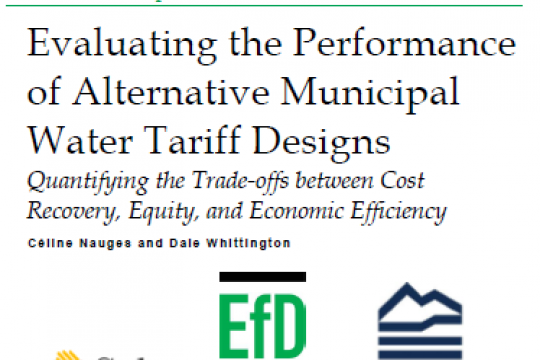The design of municipal water tariffs requires balancing multiple criteria such as financial self-sufficiency for the service provider, equity, and economic efficiency for society. A modelling framework is developed for analysing how alternative municipal water tariff designs affect these three criteria. It is then applied to a hypothetical community in which a municipal water utility provides metered, piped water and wastewater services to 5,000 households. We analyse how the shift from a uniform volumetric tariff to different increasing block tariff (IBT) designs affects households’ water use and water bills, and how these changes in turn affect measures of equity and economic efficiency for different financial self-sufficiency targets. We calculate how changes in assumptions about 1) the correlation between household income and water use, and 2) households’ response to average or marginal prices affect the tariffs’ performance in terms of these three criteria. The results show that IBTs perform poorly in terms of targeting subsidies to low-income households regardless of the magnitude of financial subsidies that a utility receives from high-level government. When cost recovery is low, the distribution of subsidies under IBTs is even worse if the correlation between water use and household income is high. IBTs introduce price distortions that induce economic efficiency losses, but we show that these welfare losses are relatively small when households respond to average prices instead of marginal prices.
Evaluating the Performance of Alternative Municipal Water Tariff Designs Quantifying the Trade-offs between Cost Recovery, Equity, and Economic Efficiency
EfD Authors
Country

